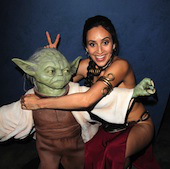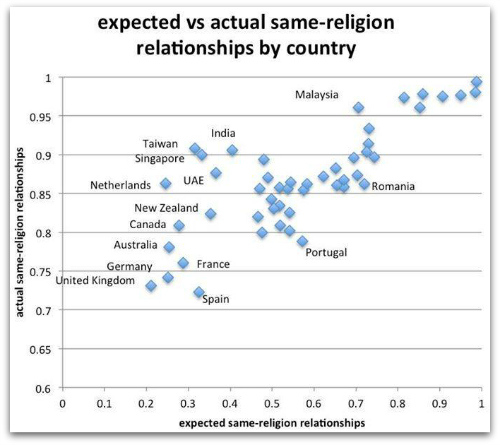Facebook knows the likely religion of your Valentine’s Day snuggle-bunny
 The Jedi Church recognises that, as its site says,
The Jedi Church recognises that, as its site says,
There is one all powerful force that binds all things in the universe together, and accepts all races and species from all over the universe as potential members of the religion.
The Jedi are few in number. At least, the Jedi who publicly proclaim their religious affiliation to be Jedi on Facebook are few in number.
Indeed, the Force may not be with you if you’re a Jedi and you want to marry another Jedi.
That is why, Facebook data crunchers have told us in the first installment of a week’s worth of Valentine’s Day relationship analysis, Jedis are the most likely of all faiths to marry people outside of their religion.
Mike Develin of Facebook Data Science writes that the Jedi numbers are not all that glum, however:
It is hard to find someone with compatible midi-chlorians*. Although considering that Jedi comprise only 0.15% of the population, it is still a rather impressive use of the Force that 13.2% of Jedi manage to find another Jedi to marry.
(*Midi-chlorians are intelligent, microscopic, symbiotic life forms living inside the cells of all living things, Wookeepedia explains, and in sufficient numbers allow a host to detect the pervasive energy field known as the Force.)
Facebook has squeezed its enormous cornucopia of personal user information to come up with analysis of anonymised, aggregated data for similar insights into other faiths’ reported romantic habits and nuptial tendencies.
Bear in mind that, again, beyond being anonymised and aggregated, the data crunching was also done on publicly reported religious affiliation. So for anyone that hasn’t disclosed their religion on Facebook, they obviously won’t be counted.

Some of the conclusions it reached and depicted in a country-by-country plot of the percentage of actual same-religion relationships against the percentage of expected same-religion relationships (if relationships were assorted randomly with respect to religion):
- Spain has the highest rate of intermarriage of any country in the sample. Yet even in Spain, only 28% of relationships are between two people of different religions.
- The UK has the lowest rate of expected same-religion relationships, and the second-lowest rate of actual same-religion relationships. Facebook data on its UK users shows a plurality of Protestants at 40%, 17% Catholics, 15% Atheists, and 11% Muslims, among other minority groups of religions. Develin writes that the mix should be expected to produce only 21% same-religion relationships, but the actual rate is 73%. “Even a melting pot of religions such as the UK still sees a large homophily effect in relationships,” he says.
- People date outside their religion more often than they marry outside it, particularly when they’re in their 20s.
- In the United States, 86% of relationships are between two people of the same religion, though the rates vary considerably depending on the religion.
- Mormons and Sikhs, despite being small fractions of the overall population, tend to keep not only marriages but also other relationships within their religion, at least in the US.
- Jews, despite having 15 times as many people in the US as Sikhs, are similar to Jedis in that they’re much more likely to intermarry.
Does it disturb you that Facebook knows whom you’re statistically likely to spend Valentine’s Day with? And, depending on your propensity to post embarrassing updates, to know how?
Happy Valentine’s Day anyway, and if you don’t think your religious affiliation or romantic inclinations are any of our business, make sure you don’t report it on Facebook!
Image of Jedis courtesy of s_bukley / Shutterstock.com. Facebook data graph from Facebook article
Article source: http://feedproxy.google.com/~r/nakedsecurity/~3/XgsQuof5eFw/